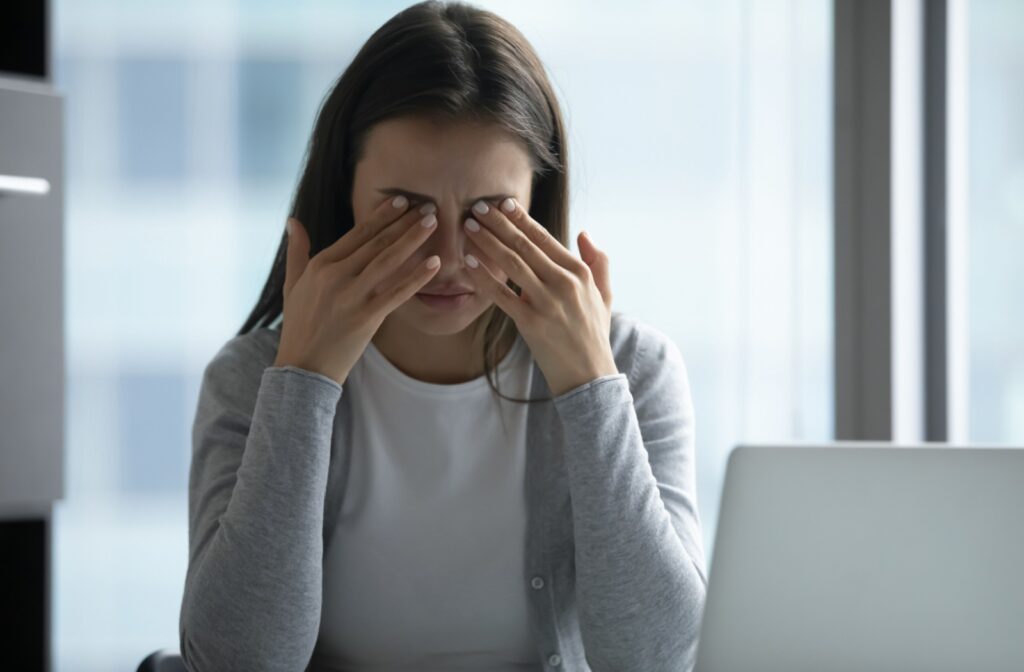Everybody cries; it’s a natural part of being alive. However, the human eye is complex, and sometimes certain problems arise that lead to feelings of burning and discomfort. So why are your eyes burning after you cry—and what can you do about it?
If you’re dealing with burning eyes, it may be due to:
- Dry eye disease
- Environmental causes
- Sweat
- Allergies
- Blepharitis
Don’t deal with the discomfort alone. If you’re dealing with burning eyes, visit your optometrist to discuss potential solutions.
What Are Tears, Really?
Your tears aren’t just water. They’re made up of a complex, balanced mixture that plays a crucial role in maintaining your eye health. Tears help nourish the eye while flushing away harmful particles, keeping the eye protected while still offering a clear surface for light to enter through.
The tear film has three layers:
- The oil layer: Made in the meibomian glands, this layer keeps the tear sealed and prevents early evaporation.
- The water layer: Made in the lacrimal glands, this layer is responsible for keeping the eye nourished and lubricated while washing away harmful contaminants.
- The mucus layer: Made in the conjunctiva tissue, this layer keeps the tear film uniformly spread across the eye surface and helps the water layer stick to the eye.
The Types of Tears
Not all tears are created equal; they can vary based on their function and specific triggers. Typically, there are 3 basic types of tears:
- Basal tears
- Reflex tears
- Emotional tears
Basal Tears
Basal tears are the natural composition of your tears that moisturize, protect, and nourish your eyes. These tears keep the eye hydrated on a daily basis and protect it from dust, debris, and harmful particles.
Reflex Tears
Reflex tears are produced in response to irritants such as smoke or onions. They’re designed to flush out harmful particles and protect the eye’s surface from further damage. These tears often develop in smoky or windy environments.
Emotional Tears
Emotional tears are often triggered by strong feelings like sadness, joy, or stress. They contain high levels of hormones and proteins that can help relieve emotional tension.
Why Do My Eyes Burn After Crying?
Crying is a perfectly natural response to all kinds of situations. When you cry, your body produces a large amount of tears to:
- Flush out irritants
- Soothe your eyes
- Protect them from damage
However, this action requires your eyes to produce additional tears. Sometimes, this additional production can lead to an imbalance in your tear composition, or even cause stress and damage to the eye’s surface.
If you notice that your eyes are always burning after you cry, there’s likely something wrong with your tear composition. Tears are supposed to protect the eyes, not make your discomfort worse.
So why does this happen? There are a few possibilities.
Dry Eye Disease
Dry eye disease is a condition that affects the natural composition of your tears. More specifically, it causes an imbalance in your tear production—either too few tears are produced, or the tears produced aren’t functioning properly .
This often causes:
- Stinging or burning sensations
- Redness of the eyes
- Blurred vision
- Light sensitivity
Fortunately, dry eye disease is highly treatable. To do so, you’ll need to visit your optometrist to discuss dry eye therapy.
Environmental Causes
When you’re in a particularly stressful environment, this affects how many tears your eyes produce. Remember—your tears need to protect your eyes, so exposure to wind, dry air, and smoke can make burning sensations in the eyes much worse.
Environmental factors can quickly dry out your tear film or introduce irritating particles into the eye, intensifying your discomfort. If you often spend time in environments with harsh elements, try to take protective measures such as:
- Wearing wrap-around sunglasses
- Using a humidifier in dry conditions
- Staying hydrated
- Using lubricating eye drops
These simple tips can often make a significant difference to your comfort.

Allergies
An allergic reaction is like your immune system going into overdrive. Almost every system in your body is designed to try to flush away contaminants—even if such a response isn’t really necessary.
Allergens, like pollen, pet dander, and dust mites, trigger responses such as:
- Watery eyes
- Itchiness
- Redness
- Swelling
Avoiding allergens and using over-the-counter antihistamine eye drops can help manage these symptoms. However, for persistent conditions, it can help to see your optometrist.
Blepharitis
Blepharitis is the inflammation of the eyelids, often occurring when tiny oil glands near the base of the eyelashes become clogged. This condition can lead to various symptoms such as:
- Red and swollen eyelids
- Itching
- Burning or stinging in the eyes
- Crusty debris at the base of the eyelashes
To prevent blepharitis, proper eyelid hygiene is ideal. Make a point of regularly washing your eyelids to remove any bacterial buildup, and consider talking to your optometrist. They may be able to recommend antibiotics or anti-inflammatory medications.
Don’t Deal with Discomfort
Crying is a natural part of life, but burning sensations are unusual. If you’re dealing with burning eyes—or any other unusual symptoms—come talk to us at Santa Cruz Optometric Center. We’re here to help, so book an appointment with us today! Your comfort is just around the corner.



